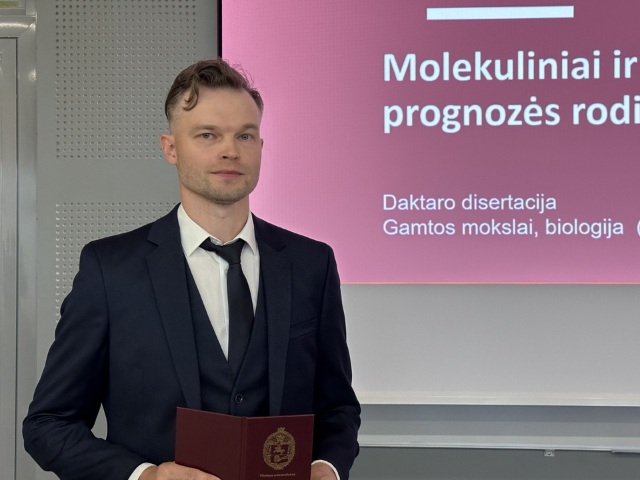Algirdas Žalimas has defended his thesis entitled "Molecular and clinical prognostic indicators of kidney cancer" for the degree of Doctor of Science in Biology.
The scientific supervisor is Prof. Dr. Sonata Jarmalaitė
Composition of the Dissertation Defense Board:
Chairperson - Prof. Dr. Rūta Navakauskienė (Vilnius University, Natural Sciences, Biochemistry);
Prof. Habil. Dr. Juozas Rimantas Lazutka (Vilnius University, Natural Sciences, Biology);
Assoc. Prof. Dr. Dalia Barsyte-Lovejoy (University of Toronto, Canada, Natural Sciences, Biology);
Prof. Dr. Tomas Poškus (Vilnius University, Medicine and Health Sciences, Medicine);
Prof. Dr. Arūnas Želvys (Vilnius University, Medicine and Health Sciences, Medicine).
The study provides scientifically-based information on the oncological safety of active surveillance for small kidney tumors and identifies prognostic factors for aggressive kidney cancer that may assist urologists in selecting an appropriate treatment strategy. The work evaluates the prognostic value of epigenetic markers in identifying aggressive forms of kidney cancer and predicting rapid tumor growth. To our knowledge, this study is the first to analyze DNA methylation in urine samples from patients with small kidney tumors and demonstrates its potential as a non-invasive tool for detecting small (up to 4 cm in diameter) malignant tumors. Based on our data, no studies have yet assessed the influence of clinical factors such as obesity, smoking, high blood pressure, metabolic syndrome, dyslipidemia, or the patient's psycho-emotional state on the progression of small, actively monitored kidney tumors, specifically rapid tumor growth.
Given the high mortality rates in Lithuania, it is important to investigate the causes of advanced kidney cancer, management methods, including metastasis in the group of patients under surveillance for small kidney tumors, and to assess the effectiveness of treatment for advanced disease. The study analyzes the response of patients with advanced kidney cancer to systemic therapy based on good and intermediate risk prognostic groups, using data from a single clinical center.
 |
